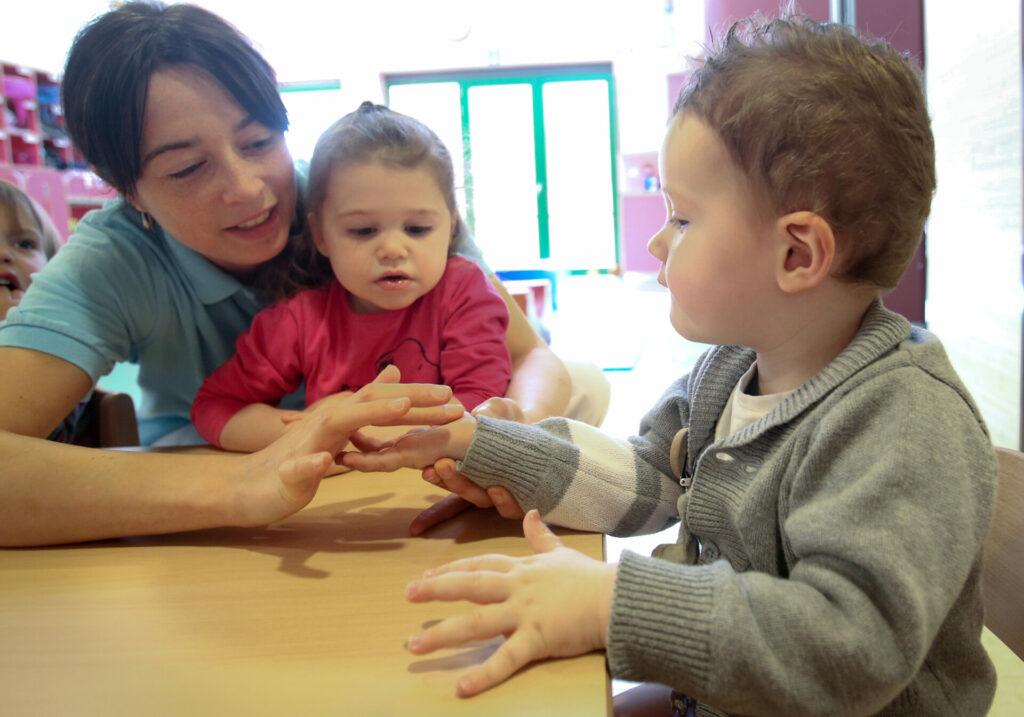There are fewer childcare centres in Brussels compared to several years ago, but new parents should not worry: the amount of places has remained stable, and even increased in some places.
The number of Francophone and Dutch-speaking childcare facilities in the Brussels-Capital Region fell from 698 in 2018 to 656 in 2022, a study by BISA, the Brussels Institute for Statistics and Analysis, showed.
That the number of closures was higher than the number of places opening was the case both for facilities recognised by the Dutch-speaking agency Kind & Gezin (the number of facilities it licenses fell from 222 to 199) and among those recognised by the French-speaking l'Office de la Naissance et de l'Enfance (ONE). It recognised 478 facilities in 2019 and 459 facilities in 2022.
Over that period, however, care capacity has risen, from 20,194 places in 2018 to 20,941 places in 2022, an increase of 746 places.
"While reception capacity in facilities licensed by Kind en Gezin fell by almost 300, from 7,038 to 6,763, that in facilities licensed by ONE increased by more than 1,000, from 13,228 to 14,250," BISA wrote. This, however, does not take into account capacity changes in existing facilities.
During the same period, the number of 0-2-year-olds who are usually placed in these childcare facilities dropped from 51,883 in 2018 to 44,819 in 2023.
More new facilities in City of Brussels, fewer in Koekelberg
In Belgium, many childcare facilities work with income-based places, meaning the price paid for the care is based on parents' income. This type of childcare is the most advantageous formula. The figures show that the biggest rise in new openings was among these facilities with income-based childcare places.
King&Gezin-approved facilities without income-related contribution lost almost 800 places, while capacity in income-related childcare increased by more than 500 places. This trend is also evident on the French-speaking side: ONE-recognised non-income-rated facilities lost 400 places while a rise of almost 500 places was recorded in income-rated facilities.
In absolute numbers, the number of openings of new facilities between 2018 and 2022 was highest in the municipalities of the City of Brussels (32 new facilities), Anderlecht (18) and Ixelles (12), and lowest in the municipalities of Koekelberg (1), Woluwe-Saint-Lambert (2) and Forest (4). The number of closures was highest in the municipalities of the City of Brussels (47), Uccle (27) and Schaerbeek (23), and lowest in the municipalities of Koekelberg (1), Saint-Josse (3) and Forest (5).
"If the number of 0-2 year-olds in a municipality is taken into account, proportionally the number of openings is highest in the municipalities of Watermael-Boitsfort, Auderghem and Ganshoren, and the number of closures in the municipalities of Watermael-Boitsfort, Ganshoren and Uccle," BISA said.
Related News
- Over 1,300 extra income-related childcare places in Brussels, Antwerp, and Ghent
- Flanders approves lowest possible childcare costs for young mothers in secondary school
The main reasons cited for closures are financial, because a licence was cancelled or due to relocations. Reforms in the sector may also have played a role.
The institute concluded that information on childcare facilities is relatively limited, which prevents BISA from examining certain factors that might explain them.
"A lack of information on the financial situation of the facilities or the lifespan of the facilities does not allow us to examine whether these factors play any role in the closures," BISA said. It added that additional research is needed on the risk factors for closures and the factors that delay the opening of new facilities.

